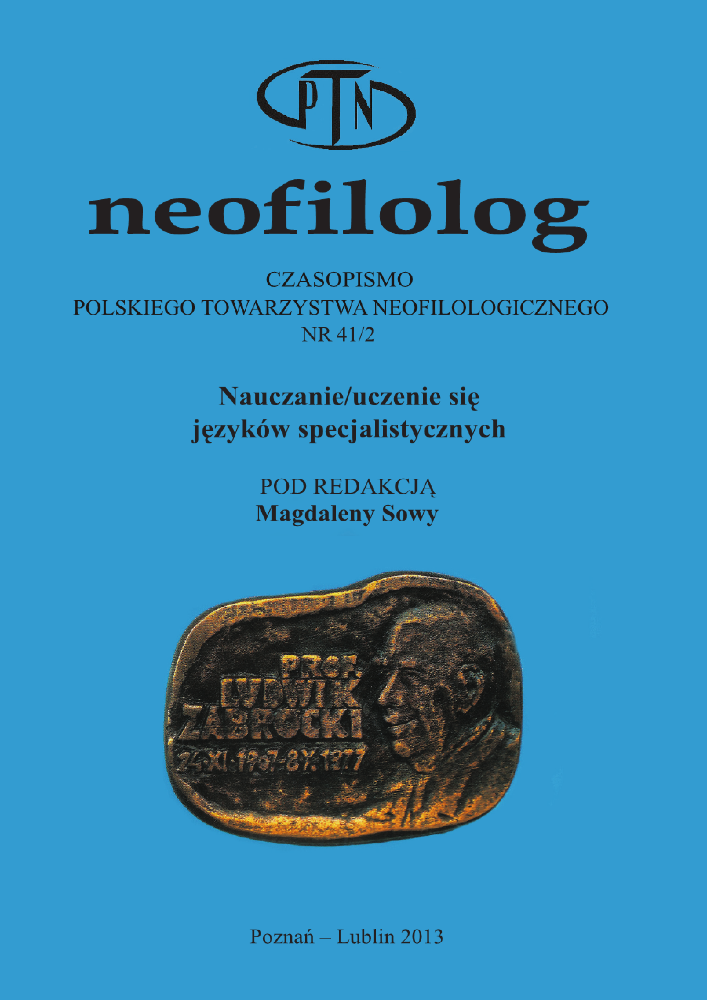Abstract
Mobility in vocational education and training (VET) is believed to have a positive impact on the development of professional skills, key competences and language proficiency. However, there are more and more voices indicating that participation in mobility may not automatically translate into an in-creased level of intercultural and linguistic skills. To enhance the educational benefit of mobility programmes, there is a need to develop measures which offer intercultural preparation and guidance. The main purpose of this article is to present the objectives and projected outcomes of the PluriMobil project, which aims to create a coherent pedagogical instrument to help secondary vocational school teachers prepare their learners for participation in different types of learning mobility.
References
Bernaldo de Quiros, B. 2012. „Wielojęzyczne kompetencje komunikacyjne na rzecz rynku pracy – strategiczny priorytet Komisji Europejskiej” (w) Kompetencje językowe podstawą sukcesu zawodowego i społecznego w Europie (red. H. Komorowska i J. Zając). Warszawa: Fundacja Rozwoju Edukacji: 53-58.
Candelier, M., A. Camillieri-Grima, V. Castellotti, J.-F. De Pietro, I. Lörincz, F.-J. Me-ißner, A. Noguerol, A. Schröder-Sura i M. Molinié. 2007. FREPA. Framework of reference for pluralistic appraoches to languages and cultures. Strasbourg/Graz: Council of Europe/ECML.
Cavalli, M., D. Coste, A. Crişan i P-H. van de Ven. 2009. Plurilingual and intercultural education as a project. Strasbourg: Language Policy Division. http://www.coe.int/t/dg4/linguistic/LangEduc/boxb-learner_en.asp#s2 [DW 20.08.2013]
Egli Cuenat M., J. Cole, C. Muller, A. Szczepanska, L. Bleichenbacher i B. Wolfer. 2011. Mobility for Plurilingual and Intercultural Education: Tools for Language Teachers and Teacher Trainers. Strasbourg: Council of Europe Publishing.
European Commission. 2010. Languages for jobs: Providing multilingual communication skills for the labour market. Brussels: European Commission. <http://ec.europa.eu/languages/pdf/languages-for-jobs-report_en.pdf>. [DW08.07.2013]
Glaser E., M. Guilherme, M. del Carmen Mendez Garcia i T. Mughan. 2007. ICOPRO-MO – Intercultural competence for professional mobility. Strasbourg: Council of Europe.
Huber-Kriegler, M., I. Lázár i J. Strange. 2003. Mirrors and Windows – An Intercultural Communication Textbook. Strasbourg: Council of Europe.
Jackson, J. 2010. Intercultural journeys: From study to residence abroad language and globalization. Hampshire: Palgrave Macmillan.
Komunikat z Brugii na temat zwiększonej współpracy europejskiej w zakresie kształcenia i szkolenia zawodowego w okresie od 2011 do 2020 roku. 2010. Bruksela: Komisja Europejska.
Laskowska, I. 2012. „Leonardo da Vinci – ucz języków zawodowo”. Języki obce w szkole (4): 87-90.
Olson, C., M. Green, i B. Hill. 2005. Building a strategic framework for comprehensive internationalization. Washington, DC: American Council on Education.
Perfetti, P. 2012. „Zapewnianie jakości mobilności edukacyjnej adeptów nauki zawodu. Pięć filarów projektu EuroApprenticeship” (w) Mobilność sposobem zdobywania i rozwijania kompetencji – od juniora do seniora (red. M. Mendel i A. Atlas). Warszawa: Fundacja Systemu Rozwoju Edukacji: 135-144.
Rada Unii Europejskiej. 2009. Zielona Księga: Promowanie mobilności edukacyjnej młodych ludzi. Bruksela: Rada Unii Europejskiej.
Rozporządzenie Ministra Edukacji Narodowej z dnia 7 lutego 2012 r. w sprawie podstawy programowej kształcenia w zawodach.
Sewell, C. 2004. „Keynote discussion” (w) Language Learning for Work in a Multilingual World (red. C. Sewell). London: CILT, the National Centre for Languages: 3-12.
Sawaniewicz, Z. 2012. „Nowa podstawa programowa kształcenia w zawodach – standard edukacyjny w szkolnictwie zawodowym.” Oświata Mazowiecka 3 (13): 26-27.
Sławecki, T. 2012. „Reforma kształcenia zawodowego w Polsce – zakładane cele i przewidywane rezultaty”. Konwent Marszałków Województw RP – 26, 27 listopada 2012 r. Gorzów Wielkopolski.
Strona internetowa:
PluriMobil – Mobility programmes for sustainable plurilingual and intercultural learn-ing plurimobil.ecml.at
License
Copyright (c) 2013 Anna Czura

This work is licensed under a Creative Commons Attribution-NoDerivatives 4.0 International License.
Authors
Authors of texts accepted for publication in Neofilolog are required to complete, sign and return to the Editorial team’s office the Agreement for granting a royalty-free license to works with a commitment to grant a CC sub-license.
Under the agreement, the authors of the texts published in Neofilolog grant Adam Mickiewicz University in Poznań a non-exclusive, royalty-free license and authorize the use of Attribution-NoDerivatives 4.0 International (CC BY-ND 4.0) Creative Commons sub-license.
The authors retain the right to the free disposal of the work.
Users
Interested Internet users are entitled to use works that have been published in Neofilolog since 2017, under the following conditions:
▪ attribution – obligation to provide, together with the distributed work, information about the authorship, title, source (link to the original work, DOI) and the license itself.
▪ no derivatives – the work must be preserved in its original form. Without the author's consent, it is not possible to distribute the modified work in the form of translations, publications, etc.
Copyrights are reserved for all texts published since 2017.
Miscellaneous
Adam Mickiewicz University in Poznań retains the property right as a whole (layout, graphic form, title, cover design, logo etc.).
